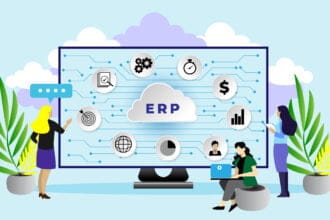
You will still always have some on-premise software (at least until internet access is free, instantly fast, and 100% ubiquitous — i.e. never.) But the bulk of your important business process are going to happen in the cloud. It’s inevitable, so you might as well get used to the idea, and get over your (increasingly irrational) fears.

You will still always have some on-premise software (at least until internet access is free, instantly fast, and 100% ubiquitous — i.e. never.) But the bulk of your important business process are going to happen in the cloud. It’s inevitable, so you might as well get used to the idea, and get over your (increasingly irrational) fears.
Don’t believe me? Even Gartner was fed up with your stalling years ago:
“Cloud computing is uniquely susceptible to the perils of myths due to the nature, confusion and hype surrounding it. Myths slow us down, impede innovation and scare us, thus distracting us from real progress, innovation and outcomes.”
Here’s why you are going to migrate to the cloud, whether you want to or not:
Because you already run in the cloud. Do you have a website? Then an important part of your customer presence and marketing is (almost certainly) already “in the cloud” (along with some cloud analytics). All we’re talking about is adding other business processes over time.
You can prototype and iterate. Cloud platforms are perfect for agile development on top of your on-premise systems. It takes time to replace core systems, but it’s easy to spin up a mobile customer application in the cloud and quickly test whether it has an effect on sales. When business people come with a new need, IT staff that tell them to come back next year are slowly going to be replaced with more “agreeable” employees. Don’t just run systems — run experiments!
Innovation is faster in the cloud. You get faster, easier innovation running in the cloud. Artificial intelligence is suddenly the next big thing. The vendor adds it to the platform, and Bam! — the sales team suddenly gets a new panel showing them which leads they should call first. Or HR gets recommendations on which resumes are most likely to lead to successful hires. And you avoid painful arguments over business cases for on-premise upgrades.
It makes you part of a network, with network effects. If you’re running in the cloud, you can optimize business processes not just across your business, but across an entire industry with easy connections to your customers, partners, and suppliers. You can add extra data services and extensions with a click. And machine learning is coming: imagine if your software automatically got better and easier to use as you used it, based on the experiences of every other user.
There won’t be any non-cloud vendors left. Call it “digital darwinism.” Cloud brings big benefits to application vendors. On-premise customers using previous versions require maintenance — and that’s are a big drain on vendor resources. And they’re not as happy as new customers because they don’t have the latest innovations. Sales people have to spend lots of time trying to help justify upgrades — time they could use to sell to new customers. Extra costs and slower innovation means that over the long term, vendors offering cloud solutions will win. (Ideally, the vendor can offer a seamless transition from on-premise to cloud because they support both environments).
BUT SECURITY?! So your CEO hates the idea of cloud computing because the data’s “not safe.” It’s time to remind her that her email — perhaps the most sensitive data you have in the company — already flies freely across public networks, protected only by security protocols. Remind her that money in your company’s bank accounts is really just data stored in ethereal databases around the globe. And don’t forget to mention that on-premise systems are compromised every day — typically with human-based methods that are independent of architecture choices.
Of course, security is important, and you should choose vendors that have a strong reputation for maintaining and protecting mission-critical systems. But ultimately Gartner, says your cloud security worries are all in your mind:
“Cloud computing is perceived as less secure. This is more of a trust issue than based on any reasonable analysis of actual security capabilities.”
BUT LAWS?! OK, so I believe you. Maybe your country says there are some systems you can’t move to the cloud — yet. But you have a lot of other systems, and it’s pretty clear which direction the future is heading. If lots of governments around the world are moving systems like HR to the cloud, then chances are you can too.
BUT MY JOB? If your job is to look after the servers, then I’m sorry. You’re a saddle-maker in a world that’s fast moving to automobiles. Now, there are still saddles in the world, so you could double-down and be an on-premise specialist. But it’s still early days for the cloud, and there are huge opportunities for anybody who understands it. If you really want to be ready for your next job interview, you should be pushing your employer to let you deploy to the cloud and learn new skills.
BUT LOCK-IN? I get this — the cloud vendor folds overnight, what happens to your data? Or maybe you don’t want to have a cost hike out of the blue. But really, you should already be careful about making a big strategic decision to go with a vendor, and in many ways, it’s harder to rip out on-premise software than it is to swap to a different cloud service. Just make sure you don’t let them railroad you on the contract (listen to your lawyers, not the IT staff that got behind on the project plan and are now pushing for a quick signature with no questions).
What now?
For whatever reason, maybe you’re not ready today for cloud solutions. But “strategy is knowing what to do when there is nothing to do.”
Use this time to run design-thinking workshops and figure out the pent-up demand for new business applications that you haven’t been able to deploy because of legacy systems. Then turn to a prototyping tool like Build, using the SAP HANA Cloud Platform, and go delight your internal customers…








